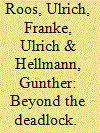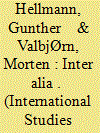|
|
|
Sort Order |
|
|
|
Items / Page
|
|
|
|
|
|
|
| Srl | Item |
| 1 |
ID:
080952


|
|
|
|
|
| Publication |
2008.
|
| Summary/Abstract |
Ever since it started in the early 1990s, the latest debate on United Nations Security Council reform has divided EU member states. This division has created a huge stumbling block for progress. It has also hampered the deepening of the EU's Common Foreign and Security Policy. This article discusses recent developments in both the UN and the EU. In particular, it sketches out how the EU can become a key power broker by reconciling the conflicting Italian and German positions towards a common European UN policy. The creation of semi-permanent SC seats seems to be the most promising solution in the short term. Moreover, such an interim approach also promises to achieve a single EU seat in the long run.
|
|
|
|
|
|
|
|
|
|
|
|
|
|
|
|
| 2 |
ID:
155322


|
|
|
|
|
| Summary/Abstract |
The field of IR has been described as an “‘inter’-type discipline,” in the sense that it is devoted to studying the interactions of different kinds of international actors (Lapid 1996, 10). However, despite the fact that the discipline has never been blind vis-à-vis the “in-between” (or relational) dimension of the subject matter (Kaiser 1971, 791; Rosenau 1990, 40–42; Kratochwil 2007, 502–3), much of the focus in recent years’ discussions has, in various ways, been directed to the inter-national in IR-theory. While acknowledging that this has alerted the discipline about the prevalent Western-centrism in much IR-theory and how it helped foster an awareness of the diversity of IR-communities around the globe, the present forum takes its point of departure in the view that in order to make the academic field of IR-theory worthy of its own name, it is now time to move the debate about global IR (Acharya 2014) a step further and connect it to what has been unearthed in recent decades’ mapping of IR around the globe. To succeed in this endeavor, this forum suggests that it is necessary to both refocus and recalibrate the “inter” in IR-theory. Thus, in addition to bringing attention back to the inter-national dimension of IR-theory, it is also necessary to examine the conditions that determine how relevant actors (e.g., scholars and practitioners) interact in producing knowledge about “the international,” that is, the forms, formats, and foci of intellectual interactions (cf. Rösch and Watanabe 2016; Acharya 2016).
|
|
|
|
|
|
|
|
|
|
|
|
|
|
|
|
| 3 |
ID:
155325


|
|
|
| 4 |
ID:
153427


|
|
|
|
|
| Summary/Abstract |
Change at the level of the international system as a whole has always been a challenging subject matter in IR. This is especially true with regard to the link between foreign policy agency and systemic transformation—processes of societal re-creation at the global level of interacting states, societies, and human beings which are significantly shaped by socialized foreign policy agents. In IR and foreign policy analysis, this link is largely taken for granted. At the same time, the connections between foreign policy agency and systemic transformation are widely considered to be essentially intractable in epistemological and methodological terms. As a result, the link has been surprisingly undertheorized. In this article, I will try to show how a Deweyan (or pragmatist) understanding of social action in general and of causal analysis in particular might help to theorize the link. More specifically, I will mobilize Deweyan notions of situated creativity, historical contingency, and event-processes as sites of interaction which emphasize the “existential” character of systemic transformation and agential resocialization. The article also reviews available methodological tools of disciplinary inquiry in order to show that many of the necessary tools to examine the links between foreign policy agency and systemic transformation are actually at hand.
|
|
|
|
|
|
|
|
|
|
|
|
|
|
|
|
| 5 |
ID:
155321


|
|
|
|
|
| Summary/Abstract |
The field of IR has been described as an “‘inter’-type discipline,” in the sense that it is devoted to studying the interactions of different kinds of international actors (Lapid 1996, 10). However, despite the fact that the discipline has never been blind vis-à-vis the “in-between” (or relational) dimension of the subject matter (Kaiser 1971, 791; Rosenau 1990, 40–42; Kratochwil 2007, 502–3), much of the focus in recent years’ discussions has, in various ways, been directed to the inter-national in IR-theory. While acknowledging that this has alerted the discipline about the prevalent Western-centrism in much IR-theory and how it helped foster an awareness of the diversity of IR-communities around the globe, the present forum takes its point of departure in the view that in order to make the academic field of IR-theory worthy of its own name, it is now time to move the debate about global IR (Acharya 2014) a step further and connect it to what has been unearthed in recent decades’ mapping of IR around the globe. To succeed in this endeavor, this forum suggests that it is necessary to both refocus and recalibrate the “inter” in IR-theory. Thus, in addition to bringing attention back to the inter-national dimension of IR-theory, it is also necessary to examine the conditions that determine how relevant actors (e.g., scholars and practitioners) interact in producing knowledge about “the international,” that is, the forms, formats, and foci of intellectual interactions (cf. Rösch and Watanabe 2016; Acharya 2016).
|
|
|
|
|
|
|
|
|
|
|
|
|
|
|
|
|
|
|
|
|